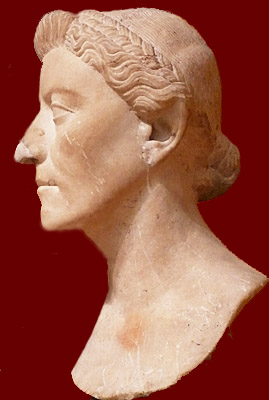
Marble portrait head of a mature woman
Roman, 31 BCE-14 CE

Julia Procilla (?-69 CE) grew up in the rarified world of the provincial aristocracy in Gallia Narbonensis. Her father was an imperial procurator of equestrian rank (see equites), perhaps the C. Valerius Procillus mentioned by Caesar (BG 1.19.3). According to the post-Republican practice of naming citizen women, she was likely named after her father; her date of birth and her mother's name are not preserved. When she became the wife of L. Julius Graecinus (c. 25 BCE-40 CE), a man noted for his integrity, who rose to senatorial rank and the praetorship under Rome's second emperor Tiberius (ruled (14-37 CE), she would have socialized among the wealthy and powerful elite in Gaul and Rome. As aristocratic women gained and maintained their social status through their male family members, when Graecinus was murdered by order of Caligula (Emperor 37-41 CE) in 40 CE, she returned to her homeland. She bore their son, Gn. Julius Agricola on 13 June 40 CE, in Forum Julii (modern Frejus) and raised him there, refusing to remarry, like Cornelia, mother of the Gracchi (see Vnivirae). She sent her son for advanced education to Massilia (modern day Marseille), a city founded by the Greeks, highly regarded by noble Romans over Athens for its disciplina and gravitas (see Strabo 4.1.5; Cicero, Flaccus 63). Tacitus celebrates the importance of Agricola’s mother as a model of strength and virtue in her son's early formation. Although he makes no reference to her own education, her parents would have prepared her to become a noble materfamilias (cf. Plutarch on the accomplishments of Pompey's young wife Cornelia). Tacitus’s recognition of the impact of Julia’s good sense and character on Agricola reflects the broader theme of the role of mater in the early education and moral development of her children extoled by Roman philosophers such as Seneca, Helv. 17.3-5, Helv. 18.8; Musonius; Cicero, Brutus 211; Quintilian, Institutiones 1.1.6. Elsewhere Tacitus criticizes mothers who leave the education of their children to nursemaids, pointing to the exemplary teaching of Cornelia, proud mother of the Gracchi, Aurelia, mother of Caesar, and Atia, mother of Augustus, that produced great leaders (Dialogus 28). Innocent like her husband, Julia Procilla fell victim to imperial ambition; in 69 CE, a fleet commanded by Otho, imperial contender after the death of Nero, looted the coast of Liguria and killed its wealthy inhabitants (Agricola 7). For more on Agricola, see "Style of Tacitus" in Dickinson College Commentaries, and A. J. Woodman, Rhetoric in Classical Historiography: Four Studies: Chapter 4 "History and Alternative Histories: Tacitus."
1. Although he emphasizes the significance of Iulia Procilla to Agricola’s life, Tacitus does little to bring out her individuality. Why might this be? How can we better understand the life of this woman?
2. What can this passage tell us about how Romans understood the role of women in education? How does it correspond to the picture presented by other authors in the World of Learning?
![]() IV.1Gnaeus Iūlius Agricola, vetere et inlūstrī
IV.1Gnaeus Iūlius Agricola, vetere et inlūstrī
![]() Foroiuliēnsium colōniā ortus,
utrumque avum prōcūrātōrem Caesarum habuit, quae
Foroiuliēnsium colōniā ortus,
utrumque avum prōcūrātōrem Caesarum habuit, quae
![]() equestris nōbilitās est. Pater illī
Iūlius Graecīnus
equestris nōbilitās est. Pater illī
Iūlius Graecīnus
![]() senātōriī ōrdinis, studiō ēloquentiae sapientiaeque iīsque ipsīs
virtūtibus īram Gāī Caesaris meritus:
senātōriī ōrdinis, studiō ēloquentiae sapientiaeque iīsque ipsīs
virtūtibus īram Gāī Caesaris meritus:
![]() namque Mārcum Sīlānum accūsāre
iussus et,
quia abnuerat, interfectus est.
namque Mārcum Sīlānum accūsāre
iussus et,
quia abnuerat, interfectus est.
IV.2Māter Iūlia Procilla fuit, rārae castitātis. In huius sinū indulgentiāque ēducātus per omnem honestārum artium cultum pueritiam adulēscentiamque trānsēgit. Arcēbat eum ab inlecebrīs peccantium praeter ipsīus bonam integramque nātūram, quod statim parvulus sēdem ac magistram studiōrum Massiliam habuit, locum Graecā cōmitāte et prōvinciālī parsimōniā mixtum ac bene compositum.
IV.3Memoriā teneō solitum ipsum nārrāre sē prīmā in iuventā studium philosophiae
![]() ācrius, ultrā quam concessum Rōmānō ac senātōrī, hausisse, nī prūdentia mātris incēnsum ac flagrantem animum coercuisset. Scīlicet sublīme et ērēctum ingenium pulchritūdinem ac speciem magnae excelsaeque glōriae vehementius quam cautē adpetēbat. Mox mītigāvit ratiō et aetās, retinuitque, quod est difficillimum, ex sapientiā modum.
ācrius, ultrā quam concessum Rōmānō ac senātōrī, hausisse, nī prūdentia mātris incēnsum ac flagrantem animum coercuisset. Scīlicet sublīme et ērēctum ingenium pulchritūdinem ac speciem magnae excelsaeque glōriae vehementius quam cautē adpetēbat. Mox mītigāvit ratiō et aetās, retinuitque, quod est difficillimum, ex sapientiā modum.
Click on the underlined words for translation aids and commentary, which will appear in a small window. Click on the icon link![]() to the right of the line for related images and information.
to the right of the line for related images and information.